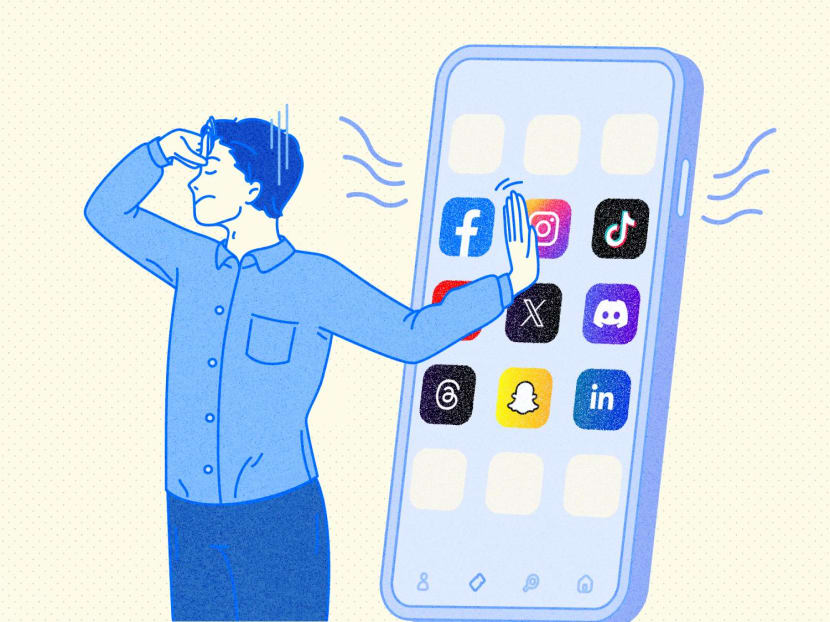Gen Zen: I tried ‘dopamine fasting’ and found unplugging isn't as easy as it sounds

(Illustration: CNA/Samuel Woo)
SINGAPORE — My family recently pointed out that even outside my official working hours, I spent a significant amount of time glued to my mobile phones or tablet, sometimes until late at night.
I demurred, saying that those little pockets of time are just moments for me to unwind from work before moving my focus to something else.
Deep down, though, I was aware how the bad habit could affect my life, if it hasn’t already.
First, it was taking a little time away from the family. Second, it was eating into time that I could otherwise use to do things I truly enjoy, or at least have proper rest.
Incidentally, someone in the office mentioned a health fad called “dopamine fasting”, a way to detox and untether from our digital devices, among other things.
Sure, she brought this up as a not-so-subtle way of asking me to try it out and write the next Gen Zen column. But hey, it sounds like a potential solution to my situation, so I gave it a whirl for about a week.
For sure, this is not the only way to unplug. Some colleagues tried other ways, like going cold turkey for a longer period. More of that in the coming weeks.
But for me, I’m just taking the small step by trying to conscientiously cut the time spent on my devices — and so far, I’ve gotten mixed results.
WHAT IS DOPAMINE FASTING
Dopamine is known as a "feel good" hormone, so in today's age, digital scrolling is a type of activity that gives people pleasure.
Some proponents believe that such activities may lead to reduced sensitivity to dopamine.
Hence, dopamine fasting is simply the act of unplugging ourselves from our phones, in the hope that it can help the brain’s dopamine receptors “reset”.
However, experts believe that this may be an oversimplistic or even erroneous take on dopamine.
Dr Lim Boon Leng, private psychiatrist from Dr BL Lim Centre for Psychological Wellness, said: “It’s pertinent to note that the dopamine reward pathway is hypothetical and dopamine fasting is somewhat of a misnomer as it suggests our dopamine level can be directly manipulated by behavioural changes.”
Dr Praveen Nair, senior consultant at Raven Counselling and Consultancy, also said that there may be a misunderstanding of the purpose of dopamine.
He added that the dopamine systems within the brain are “implicated in addictions”, but also in memories and behaviour reinforcement.
“Do note that getting dopamine is not a bad thing. Someone else can get the same sensations from playing tennis, for instance, compared to playing video games.
“The truth is that many of the suggestions of this trend are part of more established therapeutic modalities such as mindfulness. The overall package, though, appears to be a simplification of complex neural mechanisms, which can lead to misunderstanding and misuse.”
For me, I feel that if I can do Ramadan fasting yearly, going 13 hours without food and drink, how hard could it be to just cut down on X (erstwhile Twitter) and the ‘gram, right?
Wrong.
JUST UNPLUG? NOT SO... FAST
I tried this “fast” for the first few days by simply filling up my schedule with leisure activities. This way, I thought I could cut down the free time on hand I can spend on my phone.
On the first day (it was a Friday), I took more than an hour of slow walking at a park near my home before work.
The second day was filled with errands-running and other activities, while on the third, I caught up on shows, went out and sang karaoke for three hours. (I almost lost my voice, but Celine Dion makes it worth it.)
In that manner, I fully occupied myself from 8am to 8pm, or so I thought. And I felt good — physically and mentally — after doing these activities, so I really came out thinking that I’ve successfully fasted.
To my surprise, when I opened the application activity tracker on my phone on the fourth day, I discovered that I have been spending roughly the same amount of time (if not more) on my social media apps as before.
Upon a quick reflection, I realised that I might have, out of habit and without noticing, slid in pockets of time to glance at my social media apps throughout the day.
At night, I pushed back my bedtime significantly to catch up on the social media scrolling I had missed in the day.
So I took a more drastic measure, setting a time limit for my commonly used social media apps to half the amount of time I was spending on them.
Over the next few days I did this, I felt that it did not help much. More than once, I tapped the "add 10 more minutes to timer" prompts when the time limit for the app ran out.
But taking a step back, it’s better to have those pop-up reminders telling me I might not be doing as well as I thought in this fasting challenge, than to continue scrolling mindlessly for hours.
IT’S OKAY, ‘YOU ARE HUMAN’
Dr Nair said it was okay that I found this difficult, “because you are human”.
Dr Lim outlined four possible reasons I found it tough to cut myself off from my devices, despite wanting to do so:
- The use of screen time has become habitual; once formed, habits are hard to break
- We feel good when using social media, which triggers the release of dopamine, and the mind seeks these positive feelings
- The all-time presence of digital devices makes it very hard to avoid them or the temptation to use them
- There can be elements of behavioural dependency and addiction whereby a person may have withdrawal symptoms or discomfort trying to decrease screen usage
Although using these devices more frequently than I’d like may be problematic, it does not necessarily mean that I’m addicted to social media, the experts assured me.
“Addiction is often characterised by fixation on the addictive behaviour, compulsions to do so despite negative consequences, losing control over the behaviour and harmful use,” Dr Lim said.
“Should these criteria be present, one should seek professional help.”
However, barring an addiction, how problematic a certain level of behaviour (in this case, frequent usage of social media) is depends on the individuals, they emphasised.
“For instance, being a reporter, it can be a safe assumption that being engaged with social media can have links to work (for instance, being closer to the latest news),” Dr Nair said.
“As such, would such a behaviour really be maladaptive?”
In the meantime, Dr Lim said that if I’m mindful that I indeed am having a problem, he suggested these practical steps to address them:
- Gradually decrease my usage of social media rather than go cold turkey
- Schedule breaks to step away from the digital devices
- Have alternative activities such as socialising and playing sports, to take myself away from the screen
Looking at the steps, it sounds like I’m on the right track. I just have to keep it up and bear in mind that breaking old habits — especially ones that make you feel good — is not going to happen overnight.








